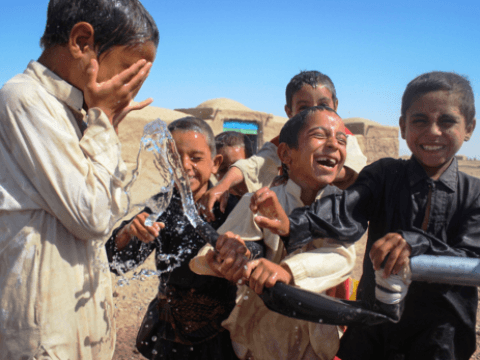Afghanistan: enjoying safe drinking water

By: Narges Ghafary, Communications; World Vision Afghanistan
In places like Robata Parniyan, a village in Zindajan district located 20 km outside the centre of the city, people spend large amounts of their time gathering water. Others suffer from water-borne diseases.
“I was sick for four days. I had dysentery and vomiting,’ says Maryam, aged 24. “As we didn’t have the money for proper medicine, I tried to use a home remedy, but it was useless. Eventually, my husband had to take me to the clinic anyways for treatment.”
Maryam’s sickness not only put her health at risk, it also jeopardized the health of her 4-month old baby girl. “When I was sick, I had to feed my baby with powdered milk and sometimes with tea and sugar,” she says, noting how her milk supply decreased due to her own dehydration. “My child cried. The powdered milk didn’t satisfy her. I was really sad that because of my sickness, my child’s future was in danger’’.
Maryam’s sickness not only put her health at risk, it also jeopardized the health of her 4-month old baby girl.
At the clinic, the doctor recommended they stop drinking water from their shallow well because their health was in danger.
Maryam, along with her family and the other community members in her village depend on water from shallow, salty wells.
“We don’t have enough money to dig a deep well,” says Maryam, with a hopeless look in her eyes.
Shallow wells bring with them a wealth of problems: the water is salty and because it is close to the surface and these wells are uncovered, which means that the water is often contaminated and unclean.
Unclean water is one of the most deadly threats for children in Afghanistan. More than 40 per cent of child deaths are due to diarrhoea and acute respiratory infection. Young babies are especially at risk as mothers who lack breast milk mix the dirty and contaminated water with powdered milk to provide food for their children.
In February 2009, World Vision conducted a baseline survey of four target districts: Kohsan, Zindanjan, Karukh and Chest-I-Sharif to further understand the problems that exist within the area. The baseline survey revealed that 25 per cent of children under 5 years old in the target districts had diarrhea during the time of the survey, while 45 per cent of children said they had suffered from diarrhoea at some point during the last two weeks prior to the survey.
Although many know the water is dangerous, they have no other alternative. They don’t have enough income to purchase clean water or even enough money to buy the fuel necessary to boil the salty water to kill bacteria.
Improvements over time
World Vision is currently implementing a 4-year USAID-funded Child Survival grant called Better Health for Afghan Mothers and Children (BHAMC) which aims to produce sustainable improvements in maternal, newborn, and child health (MNCH) for nearly 200,000 people in four districts in Herat Province: Karukh, Zindajan, Kohsan, and Chesht-i-Sharif.
As part of the programme, World Vision has repaired 30 damaged wells in 10 villages within Zindajan and Kohsan districts and drilled two new 30 metre deep wells in the Robata Pariyan and Rabat Afghan villages.
“Three days ago, we stopped using salty water,” says Maryam, with a smile. “Currently for drinking, cooking and washing, families use the well dug by World Vision. The water is a little bit tasteless for us, because we drank salty water for a long time.”
“Today and yesterday I went to school on time because I didn’t have to walk a far distance to gather water,” said Ali, who is 12 years old.
One step in a long journey
Despite the successes that we’ve seen so far, a single well in the centre of Maryam’s village is not enough to solve all of the problems related to shortages of clean water. Currently, sixty households are living in this village. Some families continue to walk around 10 km to collect water from the new well, a task which will be difficult during the winter.
“I hope this organization makes at least two more wells, so all families can enjoy drinking safe water.” said Nor Bibi, an older woman in the village.
Learn more about the issue of diarrhoea HERE.